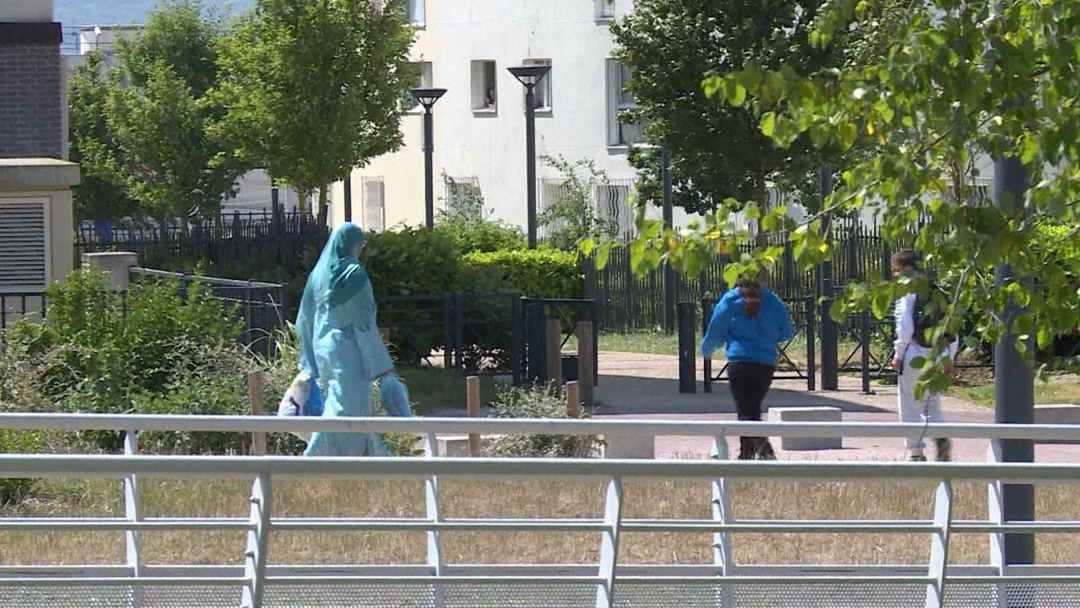
Business
20:30, 01-Mar-2018
Is the French job market racist?
By Elena Casas

France is celebrating strong economic growth and falling unemployment rate – which has dropped to 8.9 percent, the lowest since the 2009 recession.
But there's little sign of that in Chanteloup-les-Vignes, a suburb half an hour by train from central Paris. The area was nicknamed Chicago-on-Seine thanks to its reputation for urban violence in the early 1990s, which also provided the setting for the 1995 film La Haine.
It's seen several outbreaks of rioting in recent years – most recently in 2015, after police were accused of beating up suspects in custody. Across Paris' grittier suburbs like this, where a large percentage of the population is non-white, the unemployment rate is 25 percent, and 45 percent for young people under 25.

A neighborhood of Chanteloup-les-Vignes, Paris, France /CGTN Photo
A neighborhood of Chanteloup-les-Vignes, Paris, France /CGTN Photo
Foundation Face is a local charity which aims to help these young people find jobs – partly by helping them understand what employers are looking for.
“They don't know anything about the job market, they don’t know how to present themselves at all," explained the charity's Edwige Lowe.
Edwige runs workshops to help young people write CVs and practice presentation skills. When CGTN visited a training session, the participants were recording video CVs, to show them how to sell themselves to potential bosses. She said the job market could often seem completely closed off to young people from immigrant backgrounds, whose families might not know how to help them succeed in France.

An assistant helps recording a video CV for a participant at the workshop. /CGTN Photo
An assistant helps recording a video CV for a participant at the workshop. /CGTN Photo
"They don't understand how their skills can translate into getting a job," Edwige explained, "so a key part of our role here is just to build confidence, by explaining that finding a job isn't just about formal qualifications, but also all sorts of soft skills that they already have – they just don't realize it."
Edwige says a lack of confidence means young people perform badly at job interviews and fail to make a good impression on a potential employer. She says a couple of days' training can make a huge difference in the way young people present themselves.
It certainly seems to have worked for 19-year-old Aissata Kaganassy, who wants to work in tourism. "I'm really shy," she told CGTN, "but I've learnt that there’s no reason to be, I think I express myself better now, and there are lots of people around us here to encourage us, who’ve given us confidence, so you can see that in the video I made.”
Aissata says she's recently sent off dozens of applications, and she feels confident of finding a job – but it's not just a lack of self-confidence that's holding back young people in deprived areas like this.
There's also evidence of explicit discrimination. The training team here actually advise young people not to put their full address on their CV – because Chanteloup-les-Vignes has such a bad reputation, they're worried employers would throw the applications straight into the bin.
Patrick Simon is a demographer at the French National Institute of Statistics, and he's been studying discrimination in the workplace for decades. He's conducted a number of studies, sending the same CV out to employers with both a Muslim sounding and a French sounding name – and he says the French sounding names are consistently two and a half to three times more likely to get invited to interviews.

Patrick Simon, a demographer at the French National Institute of Statistics, has been studying discrimination in the workplace for decades. /CGTN Photo
Patrick Simon, a demographer at the French National Institute of Statistics, has been studying discrimination in the workplace for decades. /CGTN Photo
In France, it's illegal to collect statistics based on ethnic origin – so it's impossible to say whether unemployment is higher among some ethnic groups than others – the reason being that the French state is blind to race.
"The crucial thing is that we don't believe labeling people according to ethnicity is compatible with equality," Simon explains, "but as long as we have this idea, we won't make any progress against ethnic and racial discrimination. Because if we don't recognize the problem exists, we can't tackle it."
Laws banning racial discrimination in the workplace do exist in France – but it's difficult to prove that it has played a role in any decision to hire one job applicant over another.
President Emmanuel Macron has said places like Chanteloup-les-Vignes are a priority for him, and he's offered employers a bonus of up to 5,000 euros for hiring someone from a deprived area – but campaigners say the government must crack down harder on employers who break the law against discrimination.

SITEMAP
Copyright © 2018 CGTN. Beijing ICP prepared NO.16065310-3
Copyright © 2018 CGTN. Beijing ICP prepared NO.16065310-3